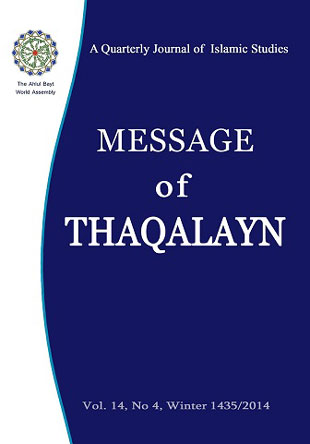فهرست مطالب

Message of Thaqalayn
Volume:14 Issue: 4, Winter 2014
- تاریخ انتشار: 1392/10/26
- تعداد عناوین: 7
-
Page 7Of the most important names God uses to describe Himself in the Qur’an is that of light (noor). God Himself is the supreme Light and all that He created are also lights. Using the Qur’an and Islamic traditions, this article addresses some of the major aspects of the concept of light. Light is one of God’s qualities, and every being in the universe is endowed with it. Moreover, the amount of light all creatures hold depends on the capacity of their existence; some beings have a fixed amount of light, while rational beings with free will, that is, human beings and jinn, can increase their light with faith and good deeds, or decrease it with disbelief and transgression.
-
Page 25Having sincere intentions (ikhlaas) in performing deeds done only out of love for God and for the sake of His pleasure is imperative in the lives of the believers, to the extent that the quality of their deeds is judged by the amount of its sincerity. Sincere intentions and deeds brings a person to the highest level of faith and nobility; to have ikhlaas is to avoid all wrong intentions that pollute a person’s thoughts and actions. This article addresses various aspects of sincerity as viewed in the Qur’an, Islamic traditions, and by Muslim scholars, as well as some of its signs and effects. Moreover, instructions on how to acquire and strengthen ikhlaas will also be stated, some of which steps include having true love for God, being certain about His oneness, yearning for what is with Him, controlling our desires.
-
Page 47The personality of Adam as the first prophet – or even the first human created – as well as the error made by him in heaven is an ongoing topic of discussion amongst followers of the Abrahamic faiths. This article is the comparison between Jewish and Islamic perspectives regarding the descent of Adam and Eve. According to this research, both the Qur’an and Torah include the event of Adam and Eve’s descent along with apparent differences in the details regarding the incident.
-
Page 67Humility is a virtue in which a person does not consider himself superior to others, regards others as better than himself, and is content with his position. Sometimes ‘humility’ is mistaken for abjectness or meanness, a quality that is rejected in Islam. Verses in the Qur’an and hadith provide criteria for virtuous humility; these criteria distinguish humility from abjectness. In this article, examples of virtuous humility in some contemporary great scholars’ conduct have been provided, and praiseworthy humility referred to in the Holy Qur’an and hadiths have been introduced and elaborated on.
-
Page 81The preceding articles in this series explored the historical origins of important religious seminaries in the Shi‘a world given its importance in promoting the instructions of the Qur’an and the Ahlul Bayt, and its role in engendering a unique culture in the scientific, social, and political spheres. The seminaries created knowledgeable and pious Shi‘a scholars who pursued ijtihad with the use of the Qur’an, sunnah, and reason to respond to the needs of the Muslim community. The previous part focused on the Islamic Seminaries of Jabal Aamel, Isfahan, and Mashhad. This article delves into the history of the Islamic seminaries of Qum. Using Islamic traditions and historical records, the significance of Qum according to the Ahlul Bayt will be stated, along with its link to Lady Ma‘sumah’s arrival to the city and its impact on the future of the seminaries’ success.
-
Page 107In the Islamic mysticism and ethics, ‘wakefulness’ (yaqzah) is the first stage of journey to God and the first phase of spiritual journey. This is to awaken a person from negligence to pay heed to the path a person takes in life. One’s inattention to this significant matter and the continuation of his negligence leads to not remembering God and the hereafter, consequently leading him to attachment to this world, committing sins and being drawn away from the status he was created for. Hence, the seekers of salvation must awaken from the slumber of negligence through self-development. The best means of achieving this goal is the instructions given to us by great Shi’a mystic scholars who spent their lives achieving perfection and embarking on the spiritual journey to God.
-
Page 123God, with His wise plan for His creation, does not create in vain or without purpose. It is not possible for us to perfectly understand everything about His plan. However, if we acknowledge the limits of our understanding, benefit from the Qur’an and Sunnah, and reflect on the history of mankind, we are able to understand some aspects of His plan and extract general lessons from historical events. This article outlines the historical role of Imam Husayn and the lessons derived from it.

